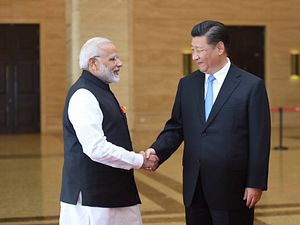After the Pulwama attack last week, Sino-Indian relations once again have come under the microscope. In its initial reaction to the attack, which killed 44 Indian paramilitary personnel last week, a Chinese foreign ministry spokesperson said the following: “China has noted the reports of suicide terrorist attack. We are deeply shocked by this attack. We express deep condolences and sympathy to the injured and bereaved families.” He went on: “We firmly oppose and strongly condemn all forms of terrorism. We hope relevant regional countries will cooperate to cope with the threat of terrorism and jointly uphold regional peace and stability.”
But when asked about China’s stance on the listing of Masood Azhar, the leader of Jaish-e-Mohammed, the group that claimed the attack, as a global terrorist by the United Nations Security Council, the refrain was familiar: “As for the issue of listing, I could tell you that the 1267 Committee of Security Council has a clear stipulation on the listing and procedure of the terrorist organisations.” Referring to New Delhi’s outreach to members of the Security Council to list Azhar as a global terrorist, Beijing argued that “JeM has been included in the Security Council terrorism sanctions list. China will continue to handle the relevant sanctions issue in a constructive and responsible manner.”
The Chinese position underwent a subtle shift against the backdrop of global outrage after the Pulwama attack, when it suggested that China will participate in the UN Security Council discussion for listing Azhar as a global terrorist in “an objective, unbiased and professional manner,” and that Beijing “will continue to do so and remain in communication with all parties including India on this issue.” Though India continues to hope for a change in China’s attitude and in essence China’s stance, the Pulwama attack notwithstanding, it is likely to remain what it has been for the past few years: that of shielding Pakistan and Azhar. Despite India’s diplomatic outreach, China has managed to consistently block India’s bid to get JeM chief Azhar declared as a designated “global terrorist” at the UN by refusing to end its “technical hold” on the ban on Azhar. This has happened twice this year alone and Beijing’s justifications are getting curiouser and curiouser. Recently, China’s vice foreign minister, Li Baodong, justified his nation’s stance by arguing that “China is opposed to all forms of terrorism. There should be no double standards on counter-terrorism, nor should one pursue own political gains in the name of counter-terrorism.”
So while many in India continue to harbor hopes of China emerging as a partner of India in its counterterrorism efforts, Chinese policymakers are under no such delusions. After all, if Azhar is problem today, it is India’s own doing. Azhar was released by the Vajpayee government in December 1999 in exchange for the release of the passengers of the hijacked Indian Airlines flight IC814. Ever since, he has been the bane of Indian security establishment. After JeM claimed responsibility for the attack on the Air Force Base in Pathankot in 2016, India has focused its efforts in getting Azhar declared a global terrorist under the aegis of the United Nations Security Council 1267 committee. China, with its veto power as a permanent member of the Security Council, has been coming to Pakistan’s aid and stalling the process in the garb of a “technical hold” before finally using its veto power to block the proposal banning Azhar in December 2016.
After the Doklam crisis, there has been a reset in Sino-Indian relations with the trip of Prime Minister Narendra Modi to China for the Wuhan summit last year. But even the spirit of Wuhan has failed to impact the Chinese position on the issue of Masood Azhar. For India, the Wuhan summit was a way to manage the negative externalities emanating out of Trump’s erratic economic policies. For Xi Jinping, it was an opportunity to rebuild fraying ties with India at a time when Washington was targeting Beijing with a single minded focus. But it in no way meant that China would give up building its military along the border with India or cease challenging India in South Asia and the Indian Ocean region. China’s support for non-state actors against India is in any case longstanding. Its role in encouraging and supporting insurgents in India’s northeast is well documented.
After the Pulwama attack, even as India has launched a diplomatic offensive to isolate Pakistan, it is not readily evident if it would have much of a success with key partners of Pakistan, China and Saudi Arabia. Saudi Arabia’s crown prince Mohammed bin Salman has already showed his priorities vis-a-vis India by signing a declaration with Pakistan which talks of avoiding “politicisation of the UN listing regime.” This is of course aimed at India’s efforts at United Nations against Masood Azhar. This despite the fact that during Modi’s visit to Saudi Arabia in 2016, an MoU on cooperation in exchange of intelligence related to money laundering and terrorism financing was signed between New Delhi and Riyadh.
China, too, will continue to shield Pakistan much like before. The Wuhan spirit, if it ever existed, is gasping for breath. And New Delhi will have to firmer in its response to China. If China wants to continue with its Pakistan policy, then India should signal its resolve of looking at its China policy through the Pakistani prism as well. The two Asian giants do share global interests but bilateral issues are becoming too huge to be sidelined at the altar of some mythical Asian century. China should get this message now. Meandering along the usual path doesn’t seems to be an option anymore.

































